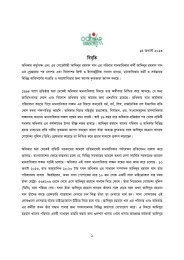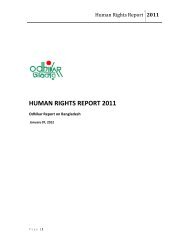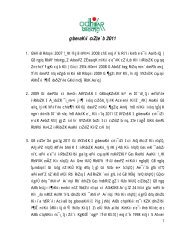Please - Odhikar
Please - Odhikar
Please - Odhikar
You also want an ePaper? Increase the reach of your titles
YUMPU automatically turns print PDFs into web optimized ePapers that Google loves.
At the international level, rights of victims has been enlisted in the Declaration of Basic<br />
Principles of Justice for Victims of Crime and Abuse of Power [ G.A. res.40/34, annex, 40 U.N.<br />
GAOR Supp.(No. 53) at 214, U.N. Doc. A/40/53 (1985) ]. The Declaration provides victims of<br />
crime and abuse of power the right to be a party to the criminal proceedings against the accused.<br />
Under the Declaration a person may be considered a victim, regardless of whether the<br />
perpetrator is identified, apprehended, prosecuted or convicted and regardless of the familial<br />
relationship between the perpetrator and the victim. The Declaration provides that the term<br />
"victim" also includes, where appropriate, the immediate family or dependents of the direct<br />
victim and persons who have suffered harm in intervening to assist victims in distress or to<br />
prevent victimization.<br />
The Declaration provides following rights by a victim of crime:<br />
1. Victims should be treated with compassion and respect for their dignity. They are entitled to<br />
access to the mechanisms of justice and to prompt redress.<br />
2. Judicial and administrative mechanisms should be established and strengthened where<br />
necessary to enable victims to obtain redress through formal or informal procedures that are<br />
expeditious, fair, inexpensive and accessible.<br />
3. Offenders or third parties responsible for their behaviour should, where appropriate, make fair<br />
restitution to victims, their families of dependants. Such restitution should include the return of<br />
property or payment for the harm or loss suffered, reimbursement of expenses incurred as a<br />
result of the victimization, the provision of services and the restoration of rights.<br />
4. In cases of substantial harm to the environment, restitution, if ordered, should include, as far<br />
as possible, restoration of the environment, reconstruction of the infrastructure, replacement of<br />
community facilities and reimbursement of the expenses of relocation, whenever such harm<br />
results in the dislocation of a community.<br />
5. When compensation is not fully available from the offender or other sources, States should<br />
endeavour to provide financial compensation to :<br />
� (a) Victims who have sustained significant bodily injury or impairment of physical or<br />
mental health as a result of serious crimes.<br />
* Professor Buddhadeb Chawdhury holds the Dr. Ambedkar Chair Professorship in<br />
Anthropology, Calcutta University, Coordinator, Human Rights Course, Calcutta University,<br />
Calcutta-700019.<br />
Report 2005<br />
173











